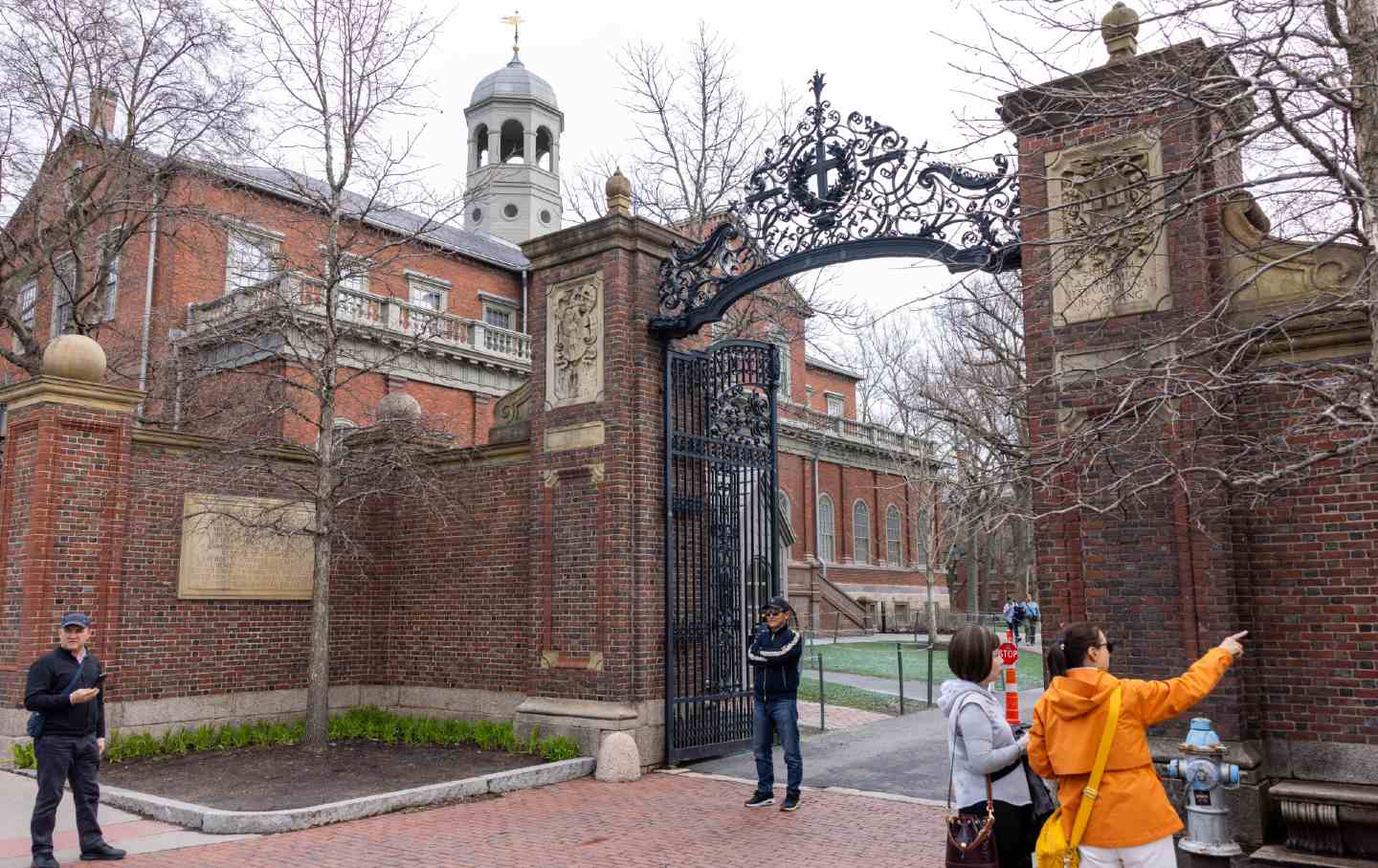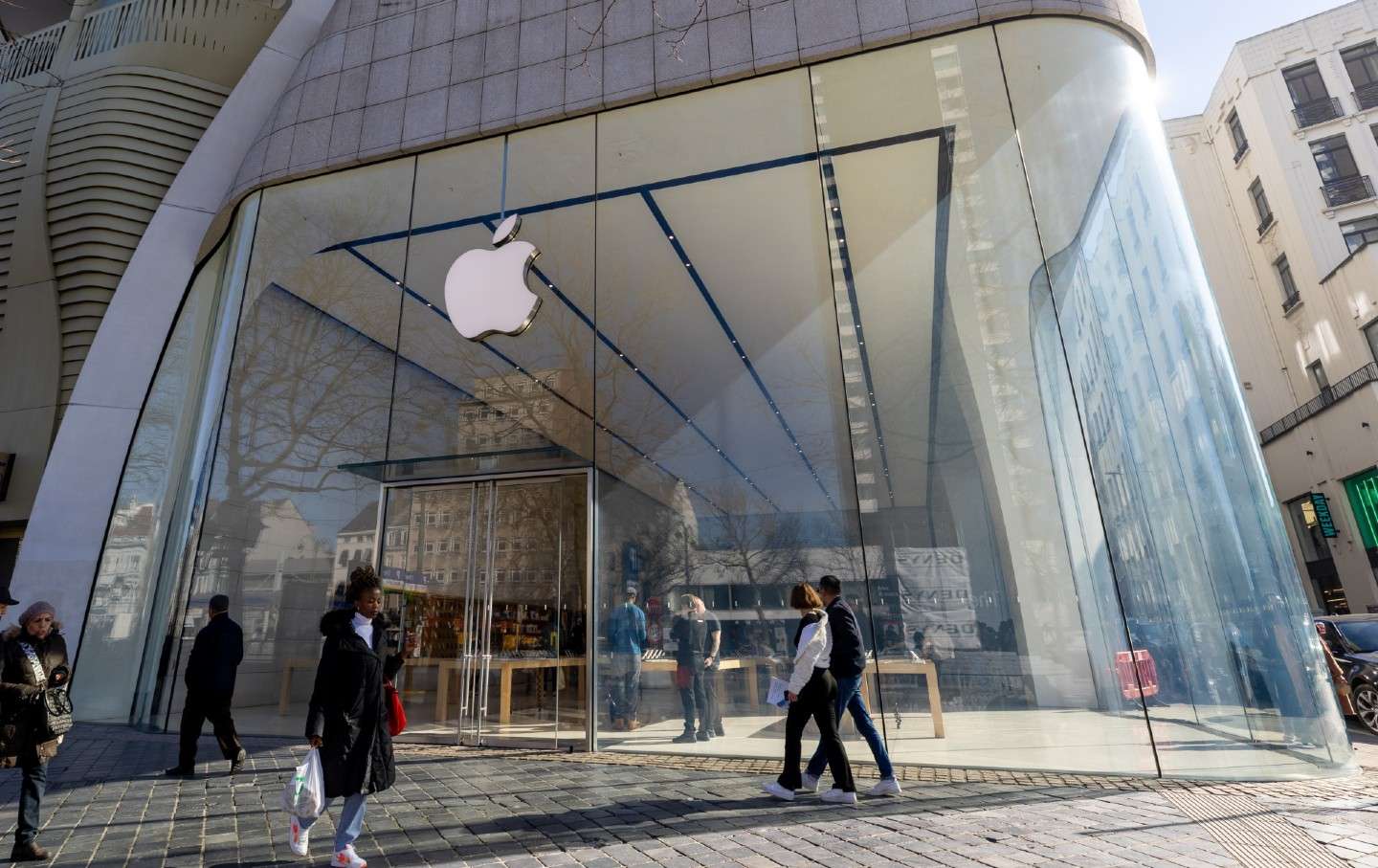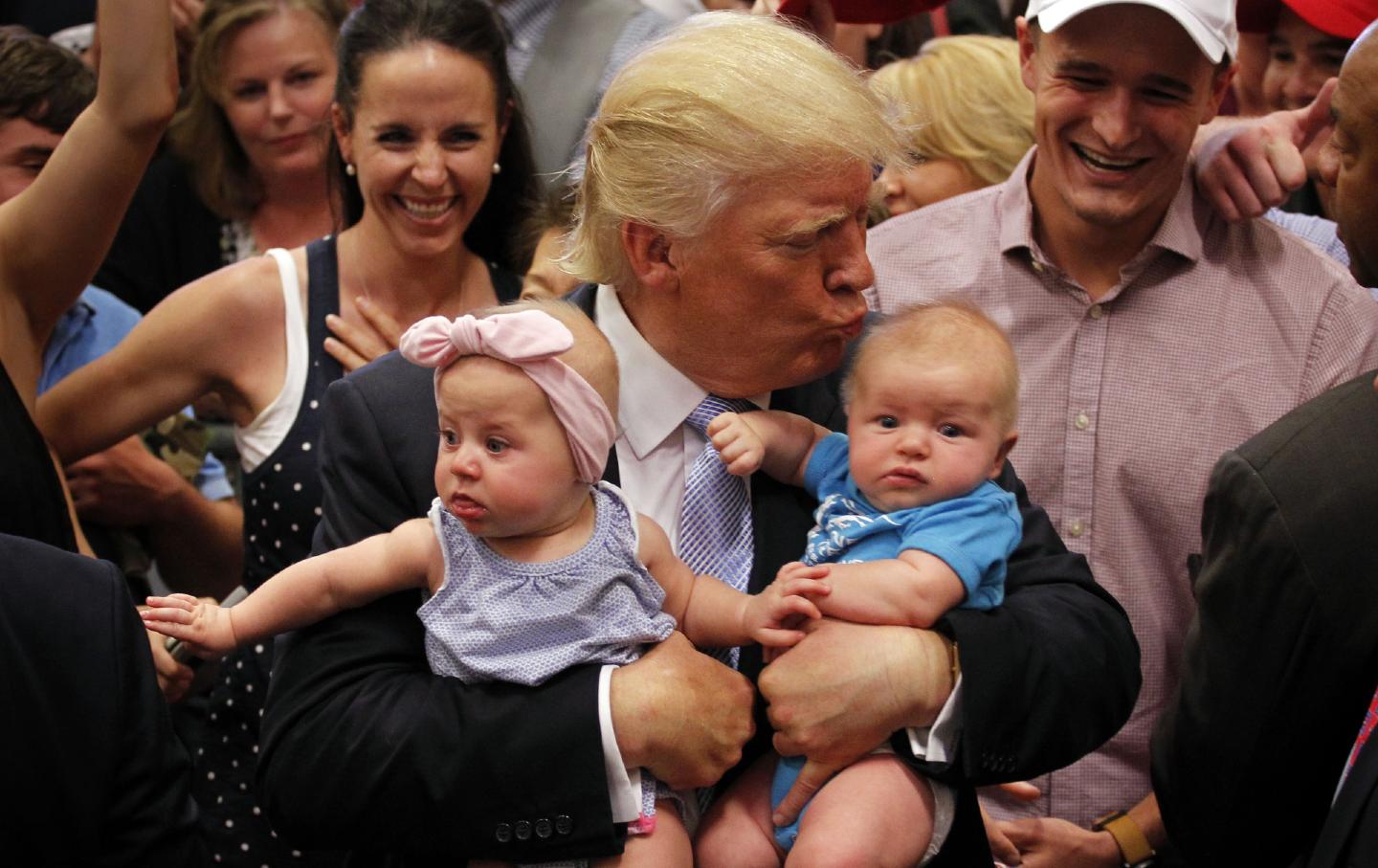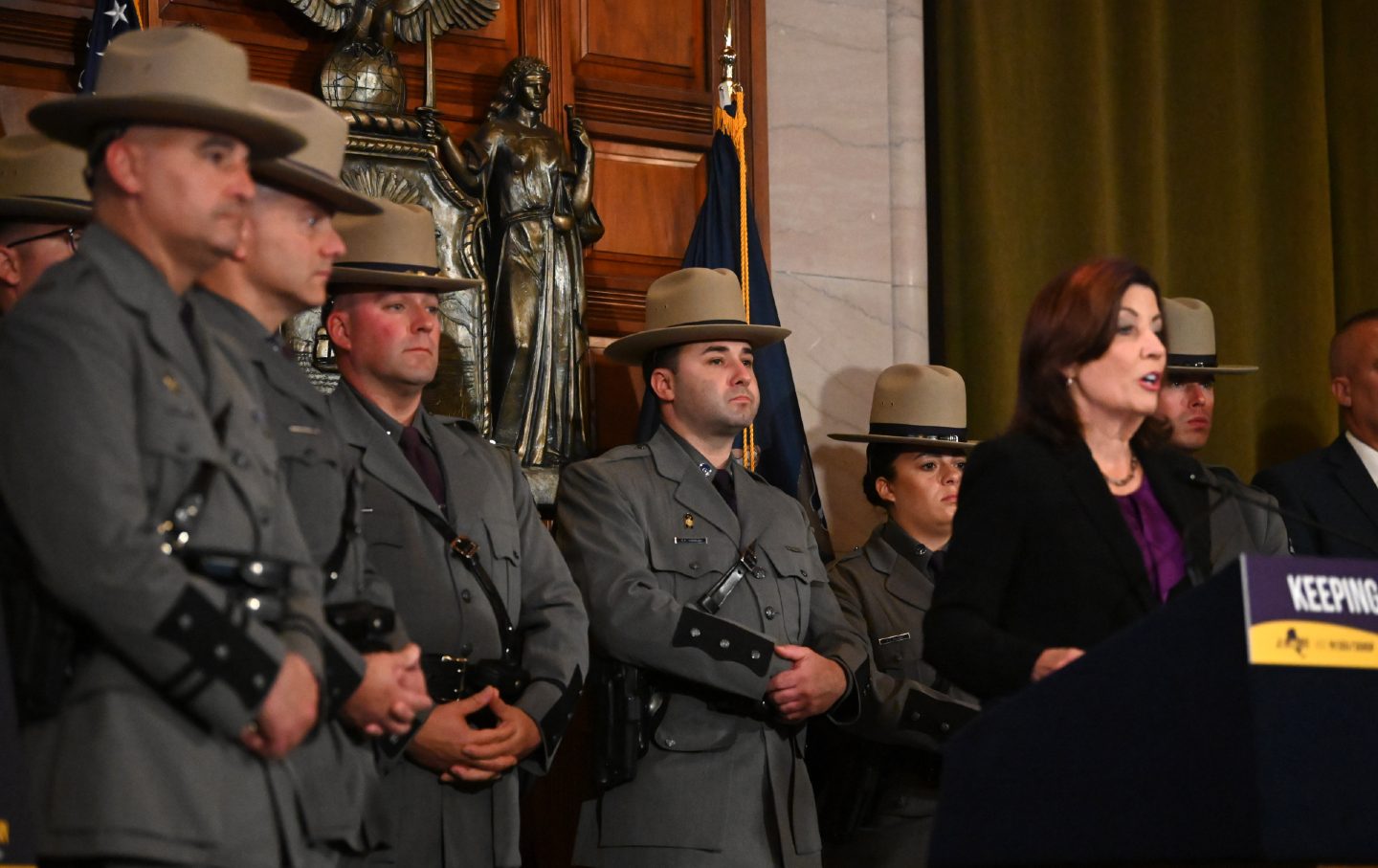Why LGBTQ Catholics Are Ambivalent About the “Gift” of Same-Sex Blessings
For some, it’s a watershed moment and for others it’s a piddling half-step. But it has the radical potential to encourage some very important conversations.
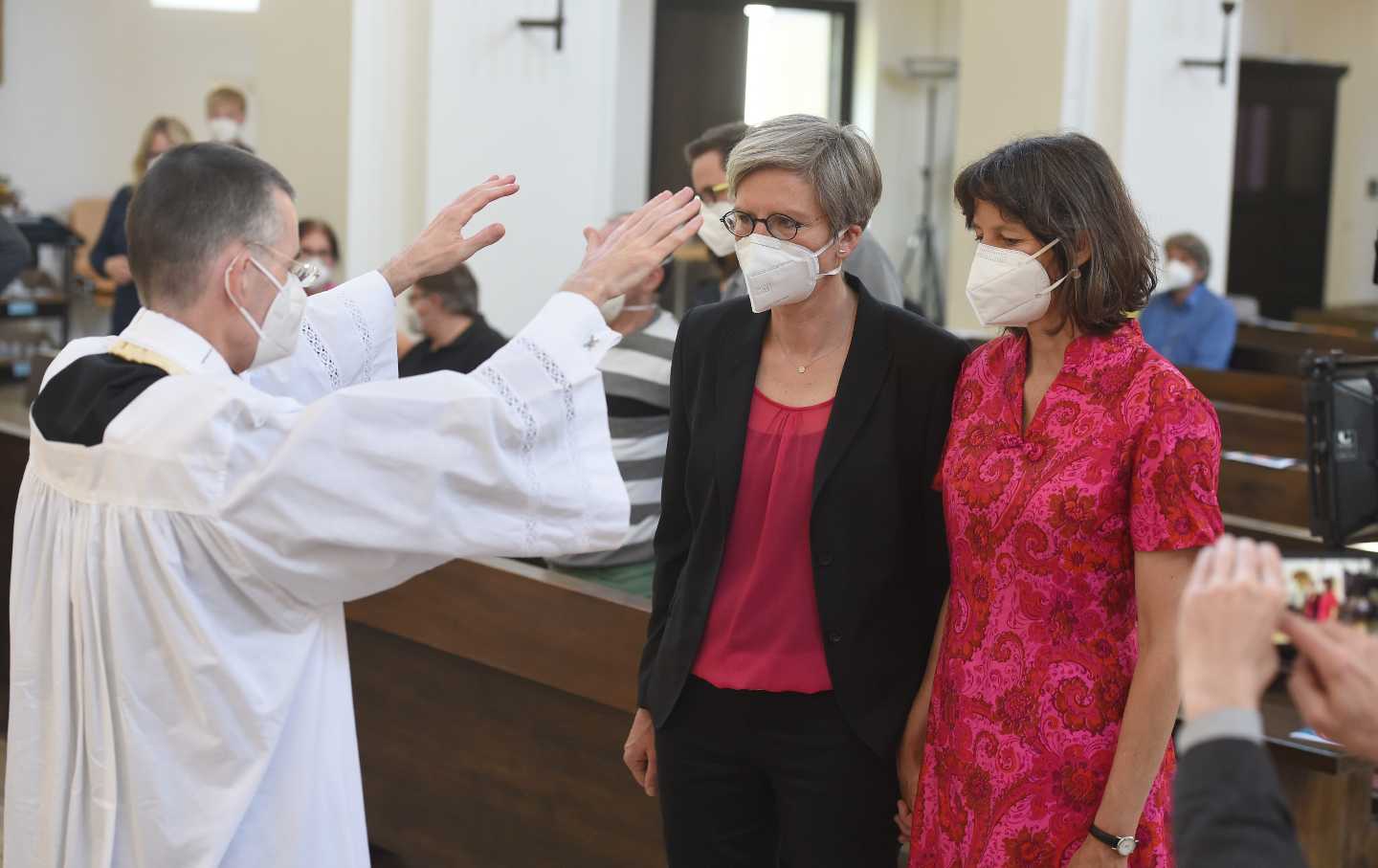
I like to remind friends that December 25 is just the first of the 12 days of Christmas. The gift wrap and bows might already be in the garbage, but there’s still the problem of what to do with the presents, particularly the big, awkward ones we didn’t necessarily ask for. A case in point is the gift the Vatican gave in late December when it granted permission for priests to extend a blessing to Catholics in “irregular” relationships. The term refers to heterosexuals in relationships not sanctioned by the church as well as same-sex couples, but most of the media attention has been trained on the latter. And while a great deal has already been written on the subject, we’re still sorting out what it means.
For those who follow the church, the announcement wasn’t a complete surprise. As early as 2021, there was talk that Pope Francis was not happy with the decision of the Dicastery for the Doctrine of the Faith (DDF, a body that promulgates Catholic doctrine) to ban the blessing of such unions. The DDF stated that there was too much risk that they would be “confused” with sacramental marriages and that it was, in any event, impossible to bless something that is not “objectively and positively ordered to receive and express grace.” That ban, however, did not stop bishops in Belgium and Germany from advancing plans to formally bless such unions. The fact that these moves were part of the “synodal path” Francis is fostering further complicated the situation. The pope could not forbid them from going forward without appearing inconsistent, nor could he simply silence other bishops who complained that the Germans and Belgians were on the road to “heresy” and “schism.”
In the words of Jesuit priest and writer Father James Martin, the December 18 declaration, Fiducia supplicans, can be seen as Francis’s attempt to “thread the needle.” Rather than flatly contradicting the DDF’s previous ban on blessing gay couples, the document draws a careful distinction between the formal blessings bestowed in a sacrament like marriage and the less formal blessings offered as part of the day-to-day pastoral activity of a priest. On the one hand, it heads off initiatives like those proposed in Germany and Belgium that might “confuse” same-sex unions with marriage, which the document still defines as “exclusive, stable, and indissoluble union between a man and a woman, naturally open to the generation of children.” At the same time, it permits priests to acknowledge and bless what is good in those relationships, and to pray that the couple involved might “live better”—a point to which we will have to return.
Not surprisingly, the declaration was met with a mix of jubilation and moral outrage. Father Martin, known for his efforts to encourage greater rapprochement between the church hierarchy and the LGBTQ community, published a photo of himself blessing two men clasping each other’s hands. At the same time, bishop conferences in Cameroon, Zambia, and Malawi have all formally forbidden priests from offering such blessings, denouncing the distinction made in the document between sacramental and non-sacramental blessings as “hypocritical.”
Less expected was the ambivalence, anger, and cynicism expressed by some LGBTQ Catholics. Mary Pezzulo, a bisexual woman in a heterosexual marriage who is well-known as a Catholic blogger, complained that the declaration is “in some ways a laughably tiny concession. In other ways, it’s a monumental step forward.” Others have been less nuanced. When asked whether he and his husband would now have their relationship blessed by a priest, my best friend told me in language too colorful for The Nation what those priests could do to themselves.
This attitude is indicative of the damage the church’s treatment of LGBTQ people has already done. It’s no secret that church membership in the United States has dropped in the last few decades, and, according to the Pew Research Center, no other religious community has suffered more precipitous losses than the Catholic Church. While there seem to be no figures for Catholics in particular, a survey published last May by the Public Religion Research Institute found that 30 percent of US adults who have left a religious community say they did so at least partially because of negative teachings regarding LGBTQ people. Offering blessings to same-sex couples might be a welcome development to those who still care about the church, but it’s not clear that it will have any effect on those who have already given up on it.
Indeed, the long-term effects of the decision are almost impossible to predict. The angry statements of the African bishops and US conservatives might raise the same specter of schism that haunted the movement to formalize blessings among the German and Belgian bishops—though the fact that Fiducia supplicans emphasizes the private, informal nature of the blessing will make it difficult for anyone to break communion with anyone else. How would any bishop or priest know that another has blessed an LGBTQ couple, unless, like Father Martin, they make it public?
The privacy of the blessings might, in fact, prove to be the stroke of genius in the declaration, insofar as it encourages on the private level the kind of dialogue Francis has been urging in the synodal process. Like other moves the DDF has made in recent weeks—the statement that transgender individuals can be baptized and serve as godparents and the reminder that women cannot be denied communion because they are single mothers—it creates occasions for new kinds of conversation. Admittedly, some of those conversations will be awkward. As Jamie Manson, president of Catholics for Choice and a lesbian, pointed out, “Given the homophobic and transphobic climate created by many bishops in the United States, the average same-sex couple likely still won’t feel comfortable presenting themselves to their local bishop or priest to ask for a blessing.” But the discomfort goes both ways. One priest on what we used to call Twitter complained that the declaration would put him in the position of saying no to people asking for blessings. In effect, both sides foresee the sort of difficult, face-to-face interactions that one expects around the family dinner table this time of year.
The declaration, then, could prove to be a gift that won’t stop giving, and that might be more than Francis bargained for. While I don’t doubt the sincerity of his desire to open the church to LGBTQ people, all indications are that his understanding of sex and gender is traditional and essentialist. The African bishops might not be completely wrong to call the declaration “hypocritical,” since the word derives from a Greek term that, among other things, means “actor.” There is bound to be an element of falseness in offering a blessing that same-sex couples will “live better” if living better is understood to live no longer as a couple. At least part of the resentment some LGBTQ Catholics feel is that these blessings will be just a kind of noblesse oblige, another bit of condescending theater meant to make cis-heterosexuals feel better about themselves.
But all those difficult conversations unleashed by the declaration could also help push that cis-heterosexual paradigm from the center of our understanding of sex and relationships and leave us looking instead at what it means to love. And that might be the glorious possibility hidden in this very awkward Christmas gift.
Hold the powerful to account by supporting The Nation
The chaos and cruelty of the Trump administration reaches new lows each week.
Trump’s catastrophic “Liberation Day” has wreaked havoc on the world economy and set up yet another constitutional crisis at home. Plainclothes officers continue to abduct university students off the streets. So-called “enemy aliens” are flown abroad to a mega prison against the orders of the courts. And Signalgate promises to be the first of many incompetence scandals that expose the brutal violence at the core of the American empire.
At a time when elite universities, powerful law firms, and influential media outlets are capitulating to Trump’s intimidation, The Nation is more determined than ever before to hold the powerful to account.
In just the last month, we’ve published reporting on how Trump outsources his mass deportation agenda to other countries, exposed the administration’s appeal to obscure laws to carry out its repressive agenda, and amplified the voices of brave student activists targeted by universities.
We also continue to tell the stories of those who fight back against Trump and Musk, whether on the streets in growing protest movements, in town halls across the country, or in critical state elections—like Wisconsin’s recent state Supreme Court race—that provide a model for resisting Trumpism and prove that Musk can’t buy our democracy.
This is the journalism that matters in 2025. But we can’t do this without you. As a reader-supported publication, we rely on the support of generous donors. Please, help make our essential independent journalism possible with a donation today.
In solidarity,
The Editors
The Nation

